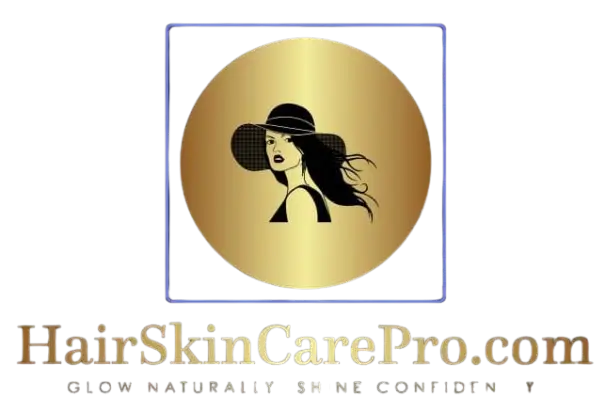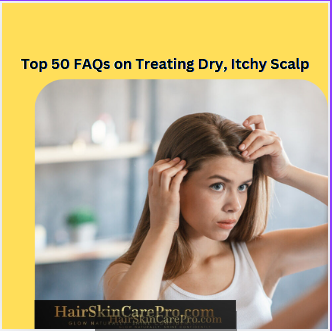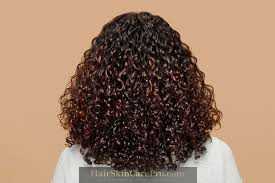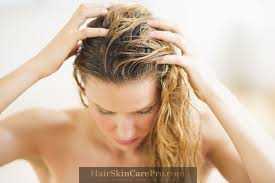Treatment for dry itchy scalp: Suffering from the discomfort of a dry, itchy scalp can present various challenges. Here, we present a detailed compilation of the 50 most frequently asked questions concerning the treatment of a dry, itchy scalp, accompanied by thorough and informative answers.
1. Understanding the Causes and treatment for dry itchy scalp
Answer:
Dryness and itchiness of the scalp stem from inadequate moisture in the skin on your head. Factors contributing to this condition include:
- Environmental Influences: Such as chilly weather, low humidity levels, and central heating, which can deplete scalp moisture.
- Excessive Washing: Regular shampooing or usage of harsh hair products that eliminate natural oils.
- Skin Ailments: Such as eczema, psoriasis, or seborrheic dermatitis.
- Allergic Sensitivities: Reactions to specific hair dyes or hair care items.
- Hydration and Nutrition: Insufficient water consumption and essential nutrient deficiencies.
- Stress Factors: Which can worsen skin-related issues, including those on the scalp.Accurate identification of the underlying cause is pivotal for successful remediation.
2. Distinguishing Dry Scalp from Dandruff
Answer:
Both dry scalp and dandruff involve flaking, but they exhibit distinctive characteristics:
- Dry Scalp:
- Presents with small, white flakes.
- The scalp feels parched, tight, and potentially itchy.
- Originates from moisture deprivation.
- Dandruff:
- Manifests as larger, oily flakes that may have a yellowish hue.
- The scalp may display oiliness or redness.
- Often spurred by yeast overgrowth (Malassezia) or seborrheic dermatitis.It is crucial to discern between these conditions as the treatment approaches vary.
3. Exploring Natural Remedies for Alleviating Dry, Itchy Scalp
Answer:
Opting for natural remedies can offer gentle yet effective relief:
- Coconut Oil: Hydrates and possesses antibacterial qualities. Gently massage warm coconut oil onto your scalp, let it sit for 30 minutes or overnight, then rinse thoroughly.
- Aloe Vera: Calms inflammation. Apply pure aloe vera gel directly onto your scalp, leave on for 20 minutes, and then wash off.
- Tea Tree Oil: Contains antifungal and anti-inflammatory properties. Incorporate a few drops into your shampoo or mix with a carrier oil before use.
- Apple Cider Vinegar: Restores scalp pH balance and fights fungus. Dilute equal parts with water, apply to the scalp, leave for 15 minutes, then rinse well.
- Olive Oil: Provides deep hydration. Warm a small amount, massage into the scalp, cover with a shower cap, leave for at least 30 minutes, and then shampoo. Remember to conduct a patch test to check for any adverse reactions before use.Adjust your approach according to your scalp’s response; individual needs vary.### Guidelines for Using Essential Oils:
- Dilution is Essential: Prioritize diluting essential oils with a carrier oil (such as jojoba or almond oil) before applying them to your skin.
- Perform a Patch Test: Before widespread use, apply a small amount to your forearm to test for possible allergic reactions.
- Recommended Oils: Consider using lavender for its soothing properties, rosemary to stimulate circulation, and peppermint for a cooling effect.It is advisable to refrain from applying undiluted essential oils directly to your skin to prevent potential irritation.Internal Hydration: Proper skin hydration is essential to maintain skin suppleness.
Dehydration Symptoms: Signs of dehydration include dry skin, fatigue, dizziness, and scalp dryness.
Recommendations: To stay hydrated, drink a minimum of 8 glasses of water daily and include hydrating foods like fruits and vegetables in your diet. Adequate hydration is crucial for overall skin health.### 19. Can Exfoliating the Scalp Help It?
Answer:
Gentle exfoliation can offer benefits:
- Advantages: Removes dead skin cells, product residue, and enhances treatment absorption.
- Techniques: Opt for a scalp scrub or a soft brush designed for the scalp.
- Frequency: Weekly exfoliation is sufficient to avoid overdoing it.Ensure a gentle approach to prevent scalp irritation or damage.
20. How Does Hard Water Impact the Scalp?
Answer:
Indeed, hard water can lead to dryness:
- Mineral Build-Up: High levels of calcium and magnesium in hard water can leave deposits on the scalp and hair.
- Remedies:
- Install a water softener or a showerhead filter.
- Use chelating shampoos to eliminate mineral buildup.Addressing hard water concerns can enhance scalp health.
21. Is Hair Brushing Beneficial for a Dry Scalp?
Answer:
Brushing can be advantageous if done correctly:
- Distributes Natural Oils: Aids in spreading sebum from the scalp to the hair strands.
- Boosts Circulation: Gentle brushing can enhance scalp blood flow.
- Select the Right Brush: Opt for one with soft, natural bristles.Avoid vigorous brushing to prevent scalp irritation.
22. Can Medications Contribute to a Dry, Itchy Scalp?
Answer:
Certain medications may have skin-related side effects:
- Diuretics: Can cause general dehydration.
- Acne Treatments: Medications like isotretinoin can result in skin dryness.
- Chemotherapy Drugs: Often lead to dryness and sensitivity.If you suspect your medication is affecting your scalp, seek advice from your doctor.
23. How Does Aging Impact Scalp Health?
Answer:
Aging can bring about scalp changes:
- Diminished Oil Production: Sebaceous glands become less active, leading to dryness.
- Thinner Skin: Becomes more delicate and susceptible to irritation.
- Hair Alterations: Hair may thin out and lose moisture.Adjusting your hair care regimen can help manage these changes.
24. Could Certain Hairstyles Be Contributing to the Dryness of My Scalp?
Answer:
Indeed, certain hairstyles can impact scalp health negatively:
- Tight Hairstyles: Styles like tight ponytails, braids, or buns can exert excessive pressure on the scalp.
- Limited Airflow: Hairdos that cover the scalp entirely may lead to the accumulation of sweat and oils.
- Recommendation: Opt for looser hairstyles and allow your scalp to have regular breaks to promote a healthier scalp environment. Embracing healthy hair practices can significantly support scalp health.
25. Would Anti-Dandruff Shampoos Assist in Alleviating Dry Scalp Issues?
Answer:
They might be beneficial, depending on the underlying cause:
- When Dandruff is Present: Medicated shampoos have shown effectiveness in combating itchiness associated with dandruff.
- For Dry Scalp Concerns: Some anti-dandruff shampoos may have drying effects; it is advisable to choose products that offer moisturizing properties as well. Carefully reading labels and selecting products tailored to address your specific symptoms is key.
26. Is Scalp Massage Effective for Enhancing Scalp Health?
Answer:
Absolutely beneficial:
- Enhanced Circulation: Scalp massages promote increased blood flow to the hair follicles.
- Oil Distribution: Massaging the scalp aids in distributing natural oils, thereby nourishing the scalp.
- Relaxation Benefits: By reducing stress levels, scalp massages can contribute to overall scalp health improvement. Engage in gentle scalp massages using your fingertips for a few minutes daily to reap these benefits.
27. Should I Refrain from Using Hair Dye if I Have a Dry Scalp?
Answer:
Exercise caution:
- Potential Irritants: Hair dyes often contain chemicals that might exacerbate dryness and irritation on the scalp.
- Risk of Allergic Reactions: Hair dyes can trigger itching and redness, so it is important to be mindful of these potential reactions.
- Skin Patch Test: Prior to using a new hair dye, always conduct a patch test to assess sensitivity.
- Exploring Alternatives: Considering natural dye options like henna can be a gentler approach.Whenever possible, reduce the frequency of hair coloring to minimize potential scalp irritation.
28. Can Pillowcases Impact the Condition of My Scalp?
Answer:
Indeed, they can have an influence:
- Choice of Material: Pillowcases made of cotton have the tendency to absorb moisture from both your hair and scalp.
- Friction Effects: Rough fabrics can cause irritation to the scalp.
- Recommendation: Opt for silk or satin pillowcases to reduce moisture loss and friction on the scalp. Regularly washing pillowcases is advisable to eliminate any buildup of oils and skin cells.
29. What Role Does Sleep Play in Maintaining Scalp Health?
Answer:
Sleep plays a crucial role in facilitating skin repair and overall well-being.### Rewritten Information:
- Cell Regeneration: During sleep, the body undergoes cell regeneration to repair damaged skin cells.
- Balanced Hormones: Sufficient sleep plays a crucial role in regulating hormones that impact skin health.
- Stress Reduction: Quality sleep helps lower stress levels, benefiting overall skin health.
Aiming for 7-9 hours of sleep each night can maximize these skincare benefits.### 35. Do Probiotics Have the Potential to Enhance Scalp Health?
Answer:
There is a possibility that probiotics can have a positive impact:
- Influence on Skin via the Gut: A healthy microbiome may affect skin conditions.
- Potential Sources: Include yogurt, kefir, sauerkraut, or probiotic supplements.
While further research is required, supporting gut health could prove beneficial.
36. Is There a Connection Between Dry Scalp and Diabetes?
Answer:
Indeed, diabetes can influence skin health:
- Effects of High Blood Sugar Levels: Such as dehydration and dry skin.
- Impact of Circulation Issues: Which can affect skin repair processes.Effectively managing diabetes may help alleviate symptoms related to the skin.
37. Is Baby Shampoo Effective for Dry, Itchy Scalp?
Answer:
Opting for baby shampoos might be beneficial due to their gentle nature:
- Formulated for Mildness: Meant for sensitive skin without harsh chemicals.
- Hypoallergenic Properties: Less likelihood of causing allergic reactions.
For individuals with sensitive scalps, baby shampoos can be a suitable choice.
38. How Does Smoking Influence Scalp Health?
Answer:
Smoking can have adverse effects on the skin:
- Impact on Blood Circulation: Limits oxygen and nutrient supply to skin cells.
- Contribution to Collagen Breakdown: Accelerates skin aging and dryness.Quitting smoking can have positive effects on overall health, including scalp health.
39. Can Specific Vitamins Help Improve Dry Scalp Conditions?
Answer:
Certain vitamins play a role in supporting skin health:
- Vitamin E: An antioxidant that aids in protecting skin cells.
- Vitamin D: Crucial for skin cell growth and repair.
- Biotin (Vitamin B7): Supports the health of hair and skin.A balanced diet or supplements (following consultation with a healthcare professional) can be advantageous.
40. Does Swimming in Chlorinated Pools Contribute to Scalp Dryness?
Answer:
Chlorine has the potential to strip natural oils from the scalp:
- Preventative Measures: Wetting hair before swimming and using a swim cap.
- Post-Swim Care: Thoroughly rinsing hair and applying a moisturizing conditioner.Taking these precautions can help minimize the drying effects of chlorine.
41. Can the Use of a Humidifier Alleviate Dry Scalp?
Answer:
Enhancing air moisture levels can lead to improved skin hydration:
### 47. **Can I Skip Shampoo and Only Use Conditioner?**Answer:
Using only conditioner, also known as “co-washing,” can be a suitable hair care method for some individuals.Rewritten Text:
- Gentle Cleansing: Conditioner is capable of eliminating certain impurities while preserving natural oils.
- Ideal For: Individuals with curly or extremely dry hair.
- Considerations: Might not effectively eliminate stubborn build-up. Alternate with regular shampooing to uphold scalp cleanliness.
- Discovering the right treatment for dry itchy scalp can transform your hair health.
- Many swear by coconut oil as a natural treatment for dry itchy scalp.
- Aloe vera gel offers a soothing treatment for dry itchy scalp, reducing inflammation and irritation.
- Tea tree oil is renowned for its effectiveness as a treatment for dry itchy scalp due to its antifungal properties.
- Switching to a gentle, sulfate-free shampoo is often the first step in the treatment for dry itchy scalp.
- Hydrating from within is an overlooked treatment for dry itchy scalp; drink plenty of water daily.
- Using a humidifier in your home can be an environmental treatment for dry itchy scalp.
- Apple cider vinegar rinses balance scalp pH and are a popular home treatment for dry itchy scalp.
- Regular scalp massages stimulate circulation and serve as a beneficial treatment for dry itchy scalp.
- Avoiding hot showers is a simple yet effective treatment for dry itchy scalp.
- Incorporating omega-3 fatty acids into your diet can be a dietary treatment for dry itchy scalp.
- Over-the-counter medicated shampoos offer a convenient treatment for dry itchy scalp.
- Limiting the use of heat styling tools is an important treatment for dry itchy scalp.
- An oatmeal hair mask provides a natural treatment for dry itchy scalp, soothing irritation.
- Consulting a dermatologist can lead to a targeted treatment for dry itchy scalp tailored to your needs.
- Stress management techniques can indirectly aid in the treatment for dry itchy scalp.
- Wearing breathable hats is part of a preventative treatment for dry itchy scalp by reducing sweat buildup.
- Choosing hair products without harsh chemicals is crucial in the treatment for dry itchy scalp.
- Exfoliating the scalp gently is an effective treatment for dry itchy scalp to remove dead skin cells.
- Using conditioners specifically designed for scalp care enhances the treatment for dry itchy scalp.
By the way, have you explored the role of scalp serums in the treatment for dry itchy scalp? These serums often contain concentrated ingredients that can provide deep nourishment and relief. Additionally, understanding the root cause—whether it’s environmental factors, product build-up, or underlying skin conditions—can make your treatment for dry itchy scalp even more effective. Tailoring your approach ensures you’re not just masking symptoms but promoting lasting scalp health.
How to use curl enhancing smoothie: Your Go-To Guide for Beautiful Hair in 2025




